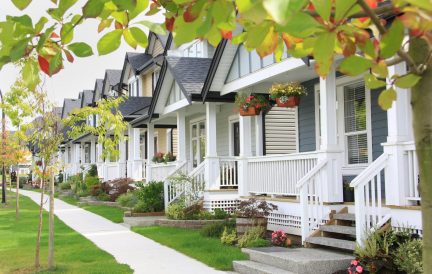Housing markets are constantly fluctuating. Our economy is rarely at stasis, and local markets can be even more volatile. For first-time homebuyers especially, prices above $300,000 can seem astronomical or even unattainable. But it’s essential to look at the market as a whole before throwing your hands in the air with exasperation (or joy!). Here’s a foolproof guide to determining if the home you’re eyeing is a good value.
Calculate the Price Per Square Foot
Price per SqFt is one easy calculation to get a gut check idea of value. Often, prices seem reasonable for the area. But how “much house” are you getting for your money? The median price per square foot in the United States is $123. But, of course, this varies by location. The average price per square foot will be much different in New York than it is in Oklahoma. It can even vary within the same city or neighborhood. Simply divide the cost of the house by the square footage to calculate this figure.
Look at Recently Sold Homes in the Area
What are other homes in your area selling for? What is the price per square foot for those homes? What did they sell for five years ago or ten years ago? Find these numbers by partnering with a local real estate agent who can help you pull stats and figures for the area you are purchasing and get an overall feel of what the market is doing. Ask yourself:
- Have these homes held their value?
- Has their value increased or decreased in recent years?
- How slow or fast have homes done under contract?
Asking these quick questions will help you feel better about the market and the price you are offering.
Check the Comps
Your agent can provide you with a Comparative Market Analysis. A CMA is an evidence-based report that will provide insight into your specific market. When you’re analyzing the comps, make sure you’re looking at sold homes, not just listed ones. The price of a listed house does not necessarily mean that it will sell for that price. It may just be the seller’s wishful thinking and not be realistic. Make sure you’re comparing your home to homes in similar condition, size, and style. For example, a fixer-upper would not accurately represent market conditions for a more updated house. Neither would be comparing a single-family home to a condo or multi-family property. Or even a place with similar square footage but expansive acreage.
Make sure your comps are similar, not just in square footage but in the number of bedrooms, bathrooms, land, etc. You also want to look at comparable properties that have sold recently, usually within six months to one year.
Calculate List Vs. Sale
We’re going to throw some industry lingo at you here. This ratio means listing price vs. selling price. You can easily find this golden ratio by dividing the listing price by the sale price and multiply by 100%. If the result is over 100%, properties are generally selling above the asking price, which likely means you are in a competitive upward moving market. If the result is under 100%, this means that homes in your area usually sell for below their listing price.
Appraisal
The appraisal is one of the last steps in a home buying process. Your lender (assuming you are financing your purchase) will issue an appraisal after you have your home under contract. A strong appraisal is a great way to feel confident in the value of your new home.
Is it Move-In Ready?
Yes, I’m talking to all you DIY-lovers out there. If your home needs improvements, make sure to calculate the estimated dollar amount you’ll need to put into these projects to make it move-in ready. Home improvements can add up quickly, so it’s essential to have these costs in mind from the start.
Disregard HGTV
No one is a bigger fan of Chip and Joanna Gaines than me. HGTV is an ultimate guilty pleasure. The before-afters that they show are inspiring. It makes me want to get off the couch and do something productive. For that reason, it’s so lovable. But ultimately, it’s still TV. Much “movie magic” is always worked throughout reality TV shows, and HGTV is not an exception. Not to mention, their budgets are usually insane and unrealistic for many. Real estate in the USA operates off of thousands of micro-markets. Both sale prices and construction prices could be drastically in real life than they are on HGTV.
Does it Feel Fair?
Value your intuition. If it feels wrong, it probably is. Know yourself. Are you the type of person who starts projects but never finishes them? Or are you a tackle and see it through kind of person? Will your monthly payments be a maximum of ⅓ of your monthly income? Will you be living in comfort but living paycheck to paycheck? Does the market appear to be in a growth state?
Do You Still Feel Unsure?
It’s important to feel confident about your purchase decisions, especially with your home. It’s usually the largest purchase decision you’ll make. Unless you plan on owning a private jet (in which case, can I come along?)
If you have any doubts or questions at all, please don’t hesitate to reach out. Our team at The Hub Realty is here for you. We want you to be confident and ecstatic about your home decision and the price you are paying. On the flip side, if you’re selling your home and have no idea what it’s realistically worth, give us a shout. We will help you maximize your sale price.
Categories

Real Estate Insights

Around Town

Home Design

Neighborhood Spotlights

Buying & Selling Tips
Uncategorized
Recent Posts

Boost Your Home’s Curb Appeal This Spring: 7 Tips for a Fresh Look

A Note About The NaR Settlement

